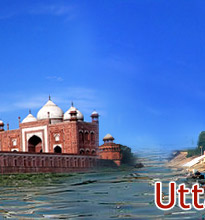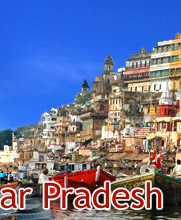 Deogarh
that is situated in the present Lalitpur district of Uttar Pradesh is a
site of great epigraphically and archaeological importance. The place
has continuously popped up in the chronicles of history related to
Gupta, the Gujjar - Pratihara, the Gond, and Muslim rulers of Delhi,
Kalpi, the Marathas and the British.
Deogarh
that is situated in the present Lalitpur district of Uttar Pradesh is a
site of great epigraphically and archaeological importance. The place
has continuously popped up in the chronicles of history related to
Gupta, the Gujjar - Pratihara, the Gond, and Muslim rulers of Delhi,
Kalpi, the Marathas and the British. Deogarh is situated on the bank of Betwa, at the western end of the Lalitpur range of hills. The cliffs that preside the river rise up to the height of 350 feet and turns into a sandstone ridge. The river takes a deep curve to the west at this juncture and passes through the extremely picturesque countryside.
For centuries, Deogarh has been famous as a temple town and attracts lots of tourists who look out for unconventional places. The most famous and the most frequented temple at the same time is Dashavatar Temple. This is a fine Vishnu temple that belongs to the Gupta period. It is one of the earliest known Panchayatan temples of north India. The terraced basement above the high temple plinth is adorned with a continuous row of sculptured panels. A highly carved doorway with Ganga -Yamuna figures lead to the sanctum. Three of the sidewalls have Vaishnavite mythological scenes carved in high relief.
The town is also famous for its various Jain temples. The city boasts of as many as 31 Jain temples. Actually Deogarh was a Jain center from the post-Gupta times up to the 17th century. Panels depicting scenes from Jain mythology, Tirthankara images can be easily found in these temples.









